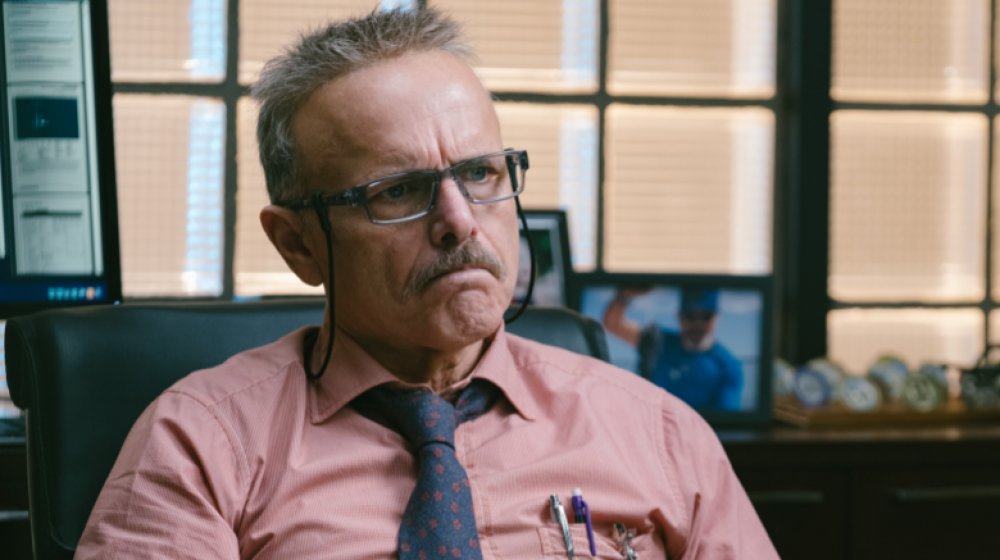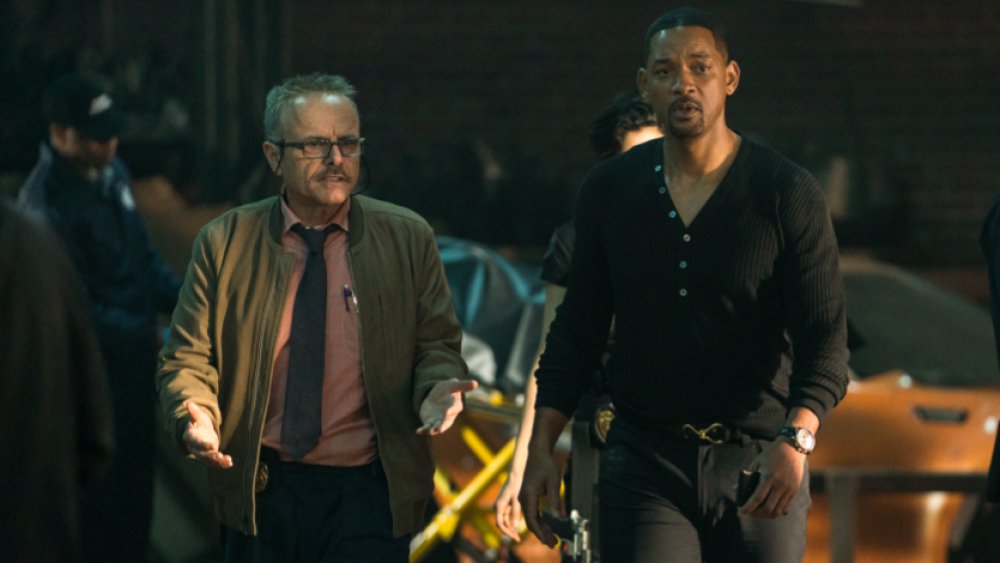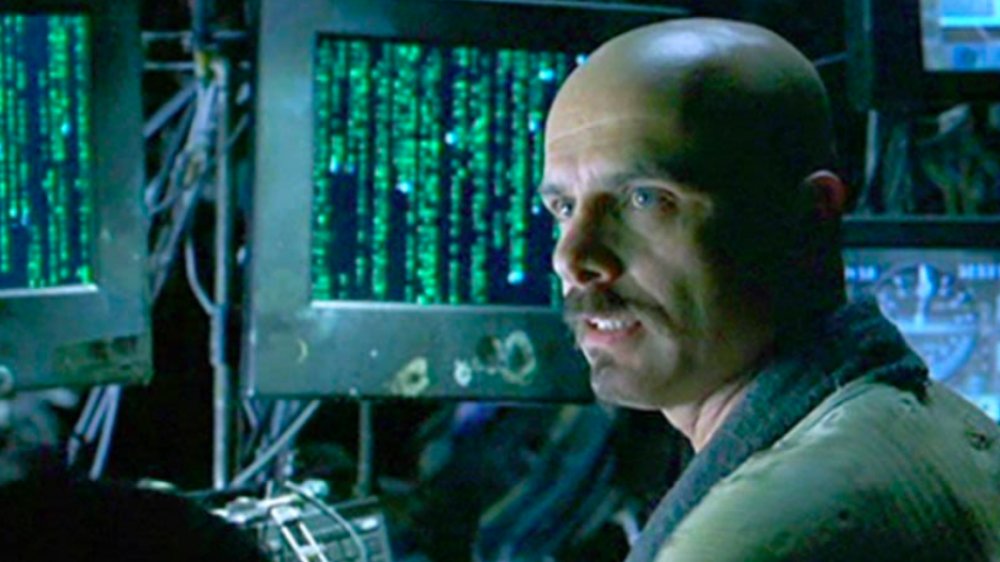Actor Joe Pantoliano Reminisces About Bad Boys, The Matrix And More - Exclusive Interview
You may not know his name, but you definitely know Joe Pantoliano's face. Over the past 40 years, he has played many memorable characters in film and TV, including parts in The Goonies, La Bamba, The Matrix, and The Sopranos. But one of his most notable — and beloved — roles has been as the colorful Captain Howard in the Bad Boys franchise.
Released in 1995, the original Bad Boys, starring Will Smith and Martin Lawrence as Miami PD detectives, offered a modern, R-rated twist on the buddy-cop genre. It also made Smith an instant A-list movie star, and spawned the 2003 sequel, Bad Boys II.
After almost two decades, the third chapter of the franchise was released in 2020: Bad Boys for Life, with Smith, Lawrence, and Pantoliano all returning.
In an exclusive interview with Looper, Pantoliano recalled some of his favorite memories on set and discussed how technology has changed over the course of his career. Here's what the prolific actor had to say. (Warning: Bad Boys for Life spoilers follow!)
Stepping back onto the Bad Boys set
What were your first thoughts when you heard they wanted to resurrect the Bad Boys franchise?
Well, I was really interested and happy, but it took years. I remember getting the first call that they wanted to do it. Then it fell apart. And then it would get back, and then it would fall apart again, and then it would get back again. By the time they said they were really doing it, I was kind of like, "It's not going to happen," until I actually got on the airplane.
What were your thoughts when you learned your character would die?
I said to the producers, "I'll do it for cheaper if you don't kill me, otherwise I want a death tax." They said, "No, we're going to go with the death tax. We'll pay for dying."
What was shooting that death scene like?
After 25 years, technology has surpassed [the original]. When I started working in show business 40 years ago, in front of these big, old Mitchell cameras, everything took a lot of time — the lighting, the technical aspects. You'd have two to three hours in between setting up for the next sequence. Now, with the new technology, everything is so fast. When I was shot I wasn't wired. You're just play-acting. Normally, historically, if you get shot, you're pressing the button, you're in control of it. The squibs go off. In this, I took my own hit, acted like I'd been shot, and went down. Then, I literally didn't see the result until everybody else saw it because it got laid in digitally later.
It's been 15 years since Bad Boys II. How hard — or easy — was it for you to get back into character and banter with Will and Martin?
It was like putting on your favorite old smoking jacket. It felt good. You didn't put on too much weight, so it still fits. It was just wonderful to see those guys again, and a lot of the people that have been [working] with them for the 25 years that I've worked with and known. They're really loyal. I owe it to them that they invited me to the party. I'm very, very grateful to have been asked to come back.
Why do you think the franchise has been so enduring and successful?
Will and Martin, for sure. They have a chemistry and a love for each other, that's not acting. You can't fake that stuff.
His favorite on-set moments
You've had a very prolific career that spans decades. What have been some of your most memorable moments on set?
Oh, gosh. What pops into my mind is Stage 16 on The Goonies — that was the water stage, where the pirate ship was — and working in that beautiful, warm water. We were shooting six-day weeks on that [movie], with sometimes three to four units. My son, who's 39 now, was like five or six years old, and he would come and we'd go swimming during lunch. It was a magical time. They don't make movies like that anymore. It can't be replicated.
Do have a favorite character you've played?
No. I don't remember the characters as much as I recall the experiences. Like being on Empire of the Sun and shooting in China in Shanghai, in 1987. Due to the Chinese Communist Party at that time, it was a big deal to allow the Spielberg production to come and shoot on the Bund, where it was still untouched. Shanghai literally hadn't been developed yet. I think that they had just put a Sheraton hotel. We were the first to live in there, while we were shooting.
I had to drive that double-clutch truck. I had to get there early and learn how to drive it. Then I had to get a Chinese driver's license. I was the only American with a Chinese driver's license. My picture was on the license and everything. That's how strict they were. It was an amazing experience. But you know what? I'm a dope. I never took the license. I always think, "It would have been so cool to have that license now." It's one of the few things I didn't take off a movie set. Usually they have to nail it down.
Another franchise you've been in is being rebooted, The Matrix. What are your thoughts on part four coming out?
I think they started shooting it already. They're probably shut down now [due to the coronavirus pandemic]. I think it's great, everybody redoing everything. I think it would have been more fun if I was in it, but what are you going to do?
Any moments that stand out from filming that movie?
Thousands. From what I can remember, we shot all the scenes in the Matrix first. We were all exterior Sydney, Australia, for the first two and a half months. Then, we went onstage to do the interior, the Nebuchadnezzar. And all you had to go by prior to that were drawings. When I walked onto the set of the Nebuchadnezzar for the first time it blew my mind. I couldn't really comprehend the visualization of what they were going for. It was just too much for me to comprehend. Then, seeing the movie, it was groundbreaking.
The Matrix technology changed films forever, what was it like working on that movie, in terms of seeing the technology?
Well, the standard part of it was not that different yet. I can't imagine what the technology is going to be like now, in part four. Working on the technology in Bad Boys for Life, considering what we were doing on Bad Boys II, it was just extraordinary, the kind of equipment and the ability to shoot so fast. They mounted the camera on the motorcycle, and everything was remote control. The camera operator was literally looking at a TV screen and designing the shot as the motorcycle was going 60 miles per hour. It made me think it would be cool to see [early 20th-century director] John Ford come back and be on a movie set, to see how much things have changed since the film pioneers have left us. It's just fascinating.
Another big role you had was in The Sopranos. Are there any moments that stand out from your time on that?
I just remember how much I enjoyed the character, the diabolic nature, and the emotional trauma that led a guy to be the kind of person that that character was. And how much fun went on with all of those great actors, and David Chase and his writing team, and the directors that would come in. The whole thing about being in show business, and the reason why I guess I lasted this long, is it's a lot of fun. It's a job you love going to. Even when you're complaining, it's better than asking if they want anchovies on their pizza.


